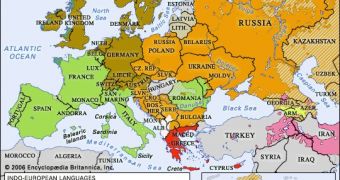Languages behave just like species. This is the conclusion of a new research published in the Nature journal, showing that languages evolve in fits and starts, rather than gradually, a phenomenon called punctuated evolution in biology.
The idea is not that new, but the British team employed mathematics to show this is real in the case of the language evolution. The team led by evolutionary biologist Quentin Atkinson and mathematician Mark Pagel of the University of Reading focused on related versions (homologs) of common words in three major language families: Indo-European, Bantu, and Austronesian. Language changes can be monitored through changes in some words, just like key genes betray a species' evolution.
The analyzed words were taken from the Swadesh lists, gathering heavily used words like numbers or body parts, which are less likely to change over time or to be borrowed, being adequate clues of language kinship. A Swadesh word is "water", which in other Indo-European languages than English varies from German "Wasser" to Hittite "watar" and Russian "voda". Even if English borrowed over 60 % of its vocabulary from Latin languages like French, the Swadesh list puts it on the Germanic group. For example, water in French is "eau" (or "agua" in Spanish and "aqua" in Latin).
The evolutionary trees revealed how new languages emerged from root languages.
"English, for example, arose when the Saxons moved to the British Isles from the European continent, separating themselves from their parent Germanic language," said Atkinson.
The team applied the mathematical models used for explaining biological speciation to languages. It appeared that languages evolved with the same fast evolving offshoots like flourishing biological groups, and less evolving languages behaved like biological groups having few offshoots.
"Most of this speed-up comes about the time the new languages break off from their ancestral lines," said Pagel. In the case of the Bantu languages, 31% of the vocabulary differences among them appeared at the moment of their separation from their parent languages.
"This marks the emergence of a new body of mathematics that applies to all evolutionary systems, whether the replicators are genes, words, or ideas," said anthropologist Tecumseh Fitch of the University of St. Andrews in Fife, U.K.

 14 DAY TRIAL //
14 DAY TRIAL //